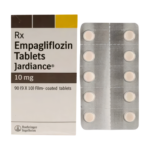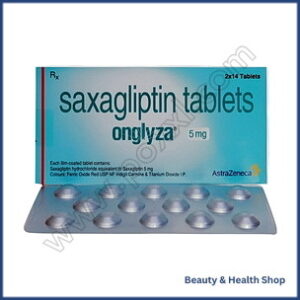ADDICTION
ALCOHOL DEPENDENCE
QUIT SMOKING
ALLERGY
ANTI FUNGAL
FUNGAL INFECTION
FUNGAL NAIL INFECTIONS
ANTI-REJECTION DRUGS
ANTI WORM
ANTIBIOTIC
BACTERIAL INFECTIONS
ARTHRITIS
GOUT
OSTEOARTHRITIS
RHEUMATOID ARTHRITIS
BLOOD
LOW PLATELET COUNT
THROMBOPHLEBITIS
VARICOSE VEINS
COLON
ANAL FISSURE
PILES
ULCERATIVE COLITIS
DIABETES CARE
DIABETES INSIPIDUS
DIABETES TYPE
DIABETIC FOOT ULCERS
GLUCOSE MONITOR
EYES/EAR CARE
DRY EYES
EYE CARE
EYE EXAMINATION
EYE INFECTION
EYE LASHES
EYE PAIN
GLAUCOMA
OCULAR HYPERTENSION
UVEITIS
FEVER CARE
MALARIA
RHEUMATIC FEVER
TYPHOID FEVER
GASTROINTESTINAL
ACIDITY
CONSTIPATION
CROHN'S DISEASE
DIARRHOEA
GALLBLADDER STONES
INTESTINAL ULCERS
IRRITABLE BOWEL SYNDROME
MOTION SICKNESS
NAUSEA
Glycomet 250 mg (Metformin)
| Active Ingredient (Generic Name): | Metformin |
|---|---|
| Indication: | Type 2 diabetes |
| Manufacturer: | USV Pvt Ltd |
| Packaging: | 15 tablets in one strip and 10 tablets in one strip |
| Strength: | 250 mg |
From: $38.00
Glycomet 250 mg (Metformin) Uses
Glycomet 250 mg (Metformin) regulates blood sugar levels, enhances insulin response, and reduces liver sugar production to manage diabetes and its complications effectively. Follow your healthcare provider’s dosage instructions, take it orally with meals, and swallow the tablets whole with water. Starting with a low dose helps minimize side effects. Glycomet also aids in polycystic ovary syndrome (PCOS) by regulating menstrual cycles and improving insulin sensitivity. Regularly monitor blood sugar levels, manage your condition effectively, and consult a healthcare provider for personalized dietary recommendations. Additionally, ensure safe storage, proper disposal, and seek immediate medical help for overdose symptoms. Key tips and brand guidelines are crucial for the best use.
Why is Glycomet (Metformin) medication prescribed?
If you have type 2 diabetes, Glycomet 250 mg (Metformin) may be prescribed to help regulate your blood sugar levels. Metformin works by reducing the amount of sugar produced by your liver and enhancing your body’s response to insulin. It’s commonly used alongside diet and exercise to handle diabetes.
By enhancing how your body utilizes insulin, Metformin helps decrease blood sugar levels and reduces the risk of complications related to diabetes, such as kidney damage, blindness, nerve problems, and loss of limbs. This medication isn’t only beneficial for controlling blood sugar but also aids in weight loss and lowering cholesterol levels.
It’s important to follow your healthcare provider’s instructions carefully while taking Metformin to achieve the best outcomes in managing your diabetes. Regular monitoring of blood sugar levels and adjustments to your treatment plan may be necessary to ensure excellent control of your condition.
How should this medicine be used?
To use Glycomet 250 mg (Metformin) effectively, follow the dosage instructions provided by your healthcare provider. Typically, this medication is taken by mouth with meals, usually once or twice daily. It’s essential to swallow the tablets whole with a full glass of water.
Your healthcare provider may start you on a low dose to minimize side effects and then gradually increase the dose. It’s vital to follow their directions carefully and not take more or less of the medication than prescribed.
Other uses for this medicine
Considering its effectiveness in managing blood sugar levels, Glycomet 250 mg (Metformin) is sometimes used off-label for conditions such as polycystic ovary syndrome. Polycystic ovary syndrome (PCOS) is a common hormonal disorder among women of reproductive age, characterized by irregular periods, high levels of male hormones, and polycystic ovaries. Metformin can help regulate menstrual cycles, improve insulin sensitivity, and lower androgen levels in women with PCOS.
Additionally, some studies suggest that Metformin may aid in weight loss for individuals with obesity or overweight, although more research is needed to confirm this benefit. Moreover, Metformin is being investigated for its potential in reducing the risk of certain cancers, such as breast cancer.
It’s important to note that the use of Metformin for these off-label purposes should be discussed with a healthcare provider, as the dosage and duration may differ from its standard use for diabetes management. Always consult a healthcare professional before using Metformin for conditions other than those approved by regulatory authorities.
What special precautions should I follow?
Before taking Glycomet 250 mg (Metformin), it’s important to check your blood sugar regularly to monitor your levels and make sure they’re within the recommended range.
This precaution helps in managing your condition effectively and avoiding any complications that may arise from uncontrolled blood sugar levels.
Check Your Blood Sugar
Make sure to regularly check your blood sugar levels to monitor the effects of Glycomet 250 mg (Metformin) on your body.
- Monitor Before and After Meals: Check your blood sugar levels before and after meals to understand how your body responds.
- Keep a Log: Maintain a log of your blood sugar readings to track patterns and share with your healthcare provider.
- Stay Consistent: Test your blood sugar at the same times each day to get accurate comparisons.
- Adjust Accordingly: Based on your readings, adjust your diet, exercise, and medication as advised by your healthcare provider.
What special dietary instructions should I follow?
To maintain stable blood sugar levels while taking Glycomet 250 mg (Metformin), consider incorporating a balanced diet rich in whole grains, lean proteins, and vegetables. Whole grains like brown rice, quinoa, and whole-wheat bread can help regulate blood sugar levels due to their fiber content. Lean proteins such as chicken, fish, tofu, or legumes can provide essential nutrients without causing spikes in blood sugar. Vegetables like leafy greens, broccoli, and bell peppers are excellent choices as they’re low in calories and high in vitamins and minerals.
It’s important to limit sugary foods and beverages, as they can lead to blood sugar fluctuations. Opt for healthier snacks like nuts, seeds, or fruits instead. Additionally, try to spread your meals throughout the day to prevent drastic changes in blood sugar levels. Remember to stay hydrated by drinking plenty of water and avoiding sugary drinks. Consulting a healthcare provider or a nutritionist for personalized dietary recommendations can also be beneficial in managing blood sugar levels effectively.
What should I do if I forget a dose?
If you fail to remember a dose of Glycomet 250 mg (Metformin), take it as soon as you recall. However, if it’s nearly time for your next dose, skip the missed dose and continue with your regular dosing schedule. Don’t take an extra dose to compensate for the missed one, as this can increase the risk of experiencing side effects.
It is vital to maintain a consistent dosing schedule with Glycomet to guarantee maximum effectiveness in managing your condition. If you frequently forget doses, consider setting a daily reminder, using a pill organizer, or integrating medication-taking into your daily routine to help you recall.
If you have any concerns about missed doses or how to best manage your medication schedule, consult your healthcare provider for guidance. They can offer personalized advice based on your individual needs and help you develop strategies to enhance adherence to your treatment plan.
What side effects can this medication cause?
Glycomet 250 Mg (Metformin) may cause some uncommon side effects that should be reported. Some of these side effects can be significant, so it’s important to contact your doctor promptly if you experience any concerning symptoms.
Taking note of these potential side effects and acting swiftly can help guarantee your health and well-being while using this medication.
Uncommon Side Effects to Report
You may experience some rare side effects while taking Glycomet 250 mg (Metformin).
- Uncommon Side Effects to Report:
- Severe muscle pain or weakness
- Irregular heartbeat
- Difficulty breathing
- Unexplained tiredness or dizziness
These less common side effects might occur while using Glycomet 250 mg. If you notice any of these symptoms, it’s essential to inform your healthcare provider promptly.
Although not everyone experiences these side effects, being aware of them can help you take quick action if needed. Remember, always consult your doctor if you have concerns about the effects of this medication.
Some side effects can be serious. If you experience any of the following symptoms, call your doctor immediately:
Immediately contact your doctor if you experience any of the following symptoms while taking Glycomet 250 mg (Metformin), as they could indicate serious side effects.
- Severe muscle pain or weakness
- Difficulty breathing or shortness of breath
- Irregular heartbeat or chest pain
- Severe stomach pain or persistent nausea
These symptoms shouldn’t be ignored, as they could be signs of a more serious reaction to the medication. Promptly informing your healthcare provider about any of these side effects is essential for proper evaluation and management.
Your doctor will be able to assess the situation and recommend the appropriate course of action to maintain your well-being while on Glycomet 250 mg (Metformin).
What should I know about the storage and disposal of this medication?
Proper storage and disposal of this medication are vital to maintain its effectiveness and prevent harm to others. Store Glycomet 250 mg (Metformin) at room temperature, away from moisture and heat. Keep it tightly closed in its original container and out of reach of children and pets. Avoid storing it in the bathroom or near the kitchen sink.
When it comes to disposing of this medication, don’t flush it down the toilet or pour it into a drain unless instructed to do so. Properly discard any expired or unused Glycomet 250 mg tablets. You can ask your pharmacist about the best way to dispose of medications that you no longer need. It’s crucial to follow these guidelines to ensure the safe and appropriate disposal of this medication.
In case of an emergency/overdose
If an emergency or overdose occurs with Glycomet 250 mg (Metformin), seek immediate medical assistance. An overdose of Glycomet can lead to serious symptoms such as extreme tiredness, weakness, difficulty breathing, stomach pain, nausea, vomiting, dizziness, lightheadedness, and fainting.
In case of an overdose, don’t try to treat it on your own or wait for symptoms to improve. Call emergency services or go to the nearest emergency room right away. It’s important to provide healthcare professionals with as much information as possible, including the amount of medication taken, the time it was ingested, and any symptoms experienced.
They’ll be able to provide the necessary treatment based on the severity of the overdose. Remember, prompt action in the event of an overdose is essential for ensuring your safety and well-being.
What other information should I know?
Before using Glycomet 250 mg (Metformin), it’s important to inform your healthcare provider about any other medications or supplements you’re currently taking. This is essential as certain drugs or supplements may interact with Metformin, leading to potential complications or reduced effectiveness. Your healthcare provider will be able to assess these interactions and make any necessary adjustments to your treatment plan.
Additionally, it’s important to be aware of the signs of low blood sugar (hypoglycemia) while taking Metformin. Symptoms such as dizziness, shakiness, sweating, and confusion may indicate low blood sugar levels and require prompt attention. It’s advisable to monitor your blood sugar levels regularly as directed by your healthcare provider to make sure that your medication is effectively managing your condition.
If you experience persistent or severe side effects while taking Glycomet 250 mg, inform your healthcare provider immediately for further evaluation and guidance.
Brand names
When considering Glycomet 250 mg (Metformin), it might be helpful to know that this medication is also sold under various brand names. These brand names may differ based on the manufacturer and region. Below is a table showing some common brand names of Metformin:
| Brand Name | Active Ingredient |
|---|---|
| Glycomet | Metformin |
| Glucophage | Metformin |
| Fortamet | Metformin |
| Riomet | Metformin |
Each of these brands contains Metformin as the active ingredient, but they may come in different formulations or strengths. It’s important to follow your healthcare provider’s guidance on which brand and dosage to take for your specific condition. Check with your pharmacist if you have any questions or concerns about the brand of Metformin you are prescribed.
Purchase From Authorized Pharmacies
To guarantee the authenticity and quality of your medication, always purchase Glycomet 250 mg (Metformin) from authorized pharmacies. Authorized pharmacies have met specific regulatory standards to assure that the medications they provide are safe and effective for consumer use. When you buy Glycomet 250 mg from authorized pharmacies, you can trust that you’re receiving the genuine product and not a counterfeit or substandard version.
By purchasing Glycomet 250 mg from authorized pharmacies, you also have access to trained pharmacists who can provide you with valuable information about the medication, such as proper usage instructions, potential side effects, and drug interactions. Additionally, authorized pharmacies maintain proper storage conditions for medications to prevent degradation and guarantee potency.
Avoid purchasing medications from unauthorized sources, such as online vendors or unlicensed stores, as these may sell counterfeit products that can be harmful to your health. Prioritize your well-being by sourcing your Glycomet 250 mg (Metformin) from reputable and authorized pharmacies.
To summarise
For a clear understanding, let’s summarize. Glycomet 250 mg, commonly known as Metformin, is a medication primarily used to treat type 2 diabetes by improving blood sugar control. It belongs to the biguanide class of drugs and works by decreasing the amount of sugar produced by the liver and increasing the sensitivity of muscle cells to insulin.
Metformin is usually taken with meals to reduce the risk of gastrointestinal side effects like nausea and diarrhea. It’s essential to follow the prescribed dosage and not exceed it to avoid adverse effects. Regular monitoring of blood sugar levels is necessary while using Glycomet 250 mg to ensure its effectiveness in managing diabetes.
This medication is available in various forms, including tablets and extended-release tablets. It’s critical to consult a healthcare provider before starting Metformin to determine the appropriate dosage and address any concerns or potential drug interactions. Overall, Glycomet 250 mg plays a significant role in controlling blood sugar levels and managing type 2 diabetes when used as directed in conjunction with a healthy lifestyle.









